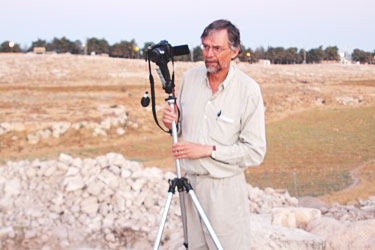Learn More About PUC
PUC Professor joins Jordan Archaeological Dig
By Midori Yoshimura on August 10, 2010
Share this

For PUC English professor John McDowell, the long days of summer began in the cool of 4:15 am, local Jordan time. From June 23-July 28, he participated in the Madaba Plains Project at Tall al ‘Umayri, an archaeological dig sponsored jointly by several Seventh-day Adventist colleges and universities. Thanks to a 2010 Herber Grant, McDowell was able to serve as this season’s lead photographer, post online weekly updates, and write articles of creative and human interest.
Why might an English professor receive a grant to work as an archaeologist? “I know archaeology is a long way from English,” McDowell says, “but there are artificial divisions. Archaeology is trying to write a story about a past. It’s connected to not only the biblical past, but also our own past. You try to get the story right, as much as possible… it’s fragmentary, you have to put it together.”
In the field, sewing the narrative together requires an early start to the day’s labors, due to the scorching dry heat of Jordan. Dig participants sift strata in five-meter-by-five-meter squares—five centimeters at a time. However, before beginning the next level, a top plan must be drawn and numerous measurements taken. After all, once a layer is removed, there’s no going back. As McDowell notes, “Archaeology is also the careful science of destruction.”
This peeling back of layers greatly impacts McDowell’s experience with his classes, particularly his Literature of the Bible and Honors classes. “Too often we read the Bible with a sense that the characters are very much like us; we read it with a kind of egocentrism… What does it take to build a house? What is it like to spend 70 percent of one’s time preparing food?” These questions may not be on any exam finals, but students benefit from McDowell’s first-hand experience with these queries—or interested individuals can inquire for themselves.
Since McDowell and PUC religion professor Myron Widmer proposed in 2003 that PUC join the consortium of supporting institutions, PUC has benefited from its connection to the Madaba Plains Project. Not only does it obtain the artifacts currently on display in the Maxwell Reading Room, but it also allows PUC to become known in a different scholarly environment, to “extend beyond the hill,” as McDowell hopes.
The English professor notes that the Madaba Plains Project is highly respected in Jordan, as evidenced by visits from dignitaries such as Ziad Al-Sa’ad, the director general of Jordan’s Department of Antiquities and La Sierra University President Randal Wisbey. The site represents a unique transition between the Bronze and Iron Ages, and its crew is known for careful methodologies and publications. “It’s one of the few digs where they sift everything,” says McDowell.
He would like to see more PUC students gather dig experiences of their own, but until they do, he shares his: “One day, I picked up out of the dirt a seal impression of a griffin. It was small, but what really impressed me was that there was also a fingerprint on the reverse side. It connects you with someone who lived a thousand years ago.” Connections such as these are what McDowell has taken back to PUC, along with a unfulfilled curiosity about what the “next three inches” of soil hold. However, the answer will have to wait until the unfolding of the next season’s chapter—and there’s room for more on the list of storytellers.
Latest News
Tad Worku’s Unconventional Path to Sharing Hope
By Sheann Brandon on April 23, 2025
Nursing Students & Faculty Return to Fiji to Serve Their Mana Family
By Ally Romanes on April 16, 2025
PUC’s Department of Music Hosts Unforgettable Festival
By Ally Romanes on April 3, 2025
Rasmussen Art Gallery Hosts Annual Faculty Show
By Ally Romanes on March 24, 2025
